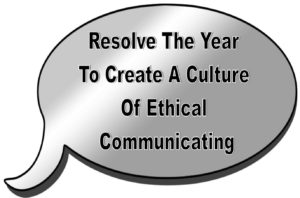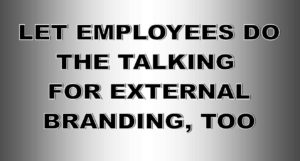Part 1 of 2
 The World Economic Forum calls the ‘rapid spread of misinformation’ one of the top 10 challenges facing our planet. According to the Pew Research Center, 10 of the 12 most-read stories on the 2016 Presidential election were ‘fake news.’ And after months of criticism, Facebook announced steps to police ‘fake news’ with third-party fact-checkers. What does our national climate of anxiety and mistrust have to do with your employees? Plenty. More than ever, your employees need to know that their workplace promotes a truth-telling culture.
The World Economic Forum calls the ‘rapid spread of misinformation’ one of the top 10 challenges facing our planet. According to the Pew Research Center, 10 of the 12 most-read stories on the 2016 Presidential election were ‘fake news.’ And after months of criticism, Facebook announced steps to police ‘fake news’ with third-party fact-checkers. What does our national climate of anxiety and mistrust have to do with your employees? Plenty. More than ever, your employees need to know that their workplace promotes a truth-telling culture.
Embed an ethical culture in your organization
HR leaders are increasingly conscious of the link between the perceived ethical “health” of their organization and the engagement of employees. Trust and respect for leaders, confidence to speak up without fearing the consequences, pride in working for the company, and a vested interest in the job are all drivers of engagement.
Key to evaluating whether your enterprise is on the right track:
• Ethical leadership (the tone at the top) — the consistent reinforcement of an organization’s ethical standards by supervisors and managers.
• Consistent and clear messaging about values.
• Employees openly supporting each other to do the right thing.
• A culture of openness and speaking up.
• Consistent and transparent decision-making.
Promote a healthier enterprise
One of your personal resolutions for 2017 may be to maintain a healthier lifestyle. Remember to promote the health of your enterprise, too.
HR practitioners are starting 2017 under a cloud of change and uncertainty. Adjusting to the realities of political developments can lead to an unsettled mood that needs to be countered in the workplace.
For HR teams, this atmosphere presents an opportunity to add out-sized value.
The spotlight will be on you to foster positivity and engagement among employees, particularly among the rising number of ‘free agents’. To do so means focusing on three areas: building trust and transparency; getting the right tools for the job; and knowing what is and isn’t working.
In my webinar, “Building Employee Loyalty from the Inside Out,” we discuss the importance of corporate story-telling to a healthy organization.
Develop a pipeline of employee-generated stories
Meaningful, real-life employee stories will be the major trend in internal communication in 2017. Employee-generated content humanizes important messages, and reinforce an open communications climate with the power to inspire employees in an authentic way.
Expect to see more employee-produced videos, short stories delivered via screensavers, and newsletter interviews with staff. These “they-are-just-like-me” tales are great for co-workers adapting to change, learning new processes and applying brand values to their roles.
At a time when loss of confidence and trust in senior leaders remain at depressingly low levels (roughly one in three employees in the U.S. feel their organization isn’t always honest and truthful), it’s easy to see how peer-to-peer content strikes the right chord.
 Let employees do the talking for external branding, too
Let employees do the talking for external branding, too
Companies are also realizing that instead of courting external experts to tweet, blog and promote their brands externally they should be turning their attention internally to their existing brand experts, their employees.
Your employees live and breathe your brand and products every day. One of the first questions they get asked at conferences or even at weekend social events is, “where do you work?” Employees are your untapped spokespeople. If provided with the correct information they can also answer the tricky questions around company ethics or the sustainability and responsibility agenda.
Companies are afraid that if they allow their employees to talk about them on social media, things could get messy. The reality is, most employees do anyway. Where you work is a significant part of your personal brand, people talk about it all the time. Rather than pushing your employees to talk about it in the dark corners of Facebook, provide them with the training and resources to do it confidently in the open.
Treat internal messaging as external
What you present to your employees should be what you present to the outside world. Every employee message should be considered as external-facing. It is now common to see leaked CEO letters and staff emails in the media, or posted to WikiLeaks or ‘fake news’ outlets. Just ask Hillary Clinton and Kathleen Kane.
If you advertise your company as having one set of values, ensure those values are taken seriously inside the organization also.
 Next time: Part 2 of “Resolve this year to create a culture of ethical communicating”
Next time: Part 2 of “Resolve this year to create a culture of ethical communicating”
David Cheatham is the founder of Transform Communications, LLC, a communications consultancy specializing in aligning employees and implementing change across the enterprise. The company’s tagline sums up David’s approach to the workplace: Inform, Engage, Inspire. ® David also teaches in the School of Business at Rutgers University. Contact: David@Transform-Communications.com © 2017 David Cheatham